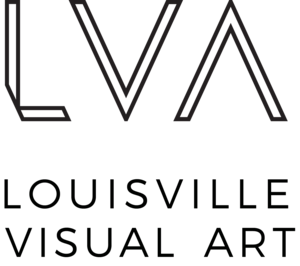"Peony" by Julius Friedman, photography
Artist, Julius Friedman. Photograph by Sarah Davis.
Once when Julius Friedman was delivering an informal lecture for Louisville Visual Art, he noted how the cover of his most recent book at the time, “Images & Ideas”, was a shot of the condensation on his shower door, and how he had once waited 2 hours for a car to move off a particularly fascinating oil and water puddle in a parking lot so he could photograph it.
Friedman’s images are characteristically so expertly constructed and expressive of a stringent graphic discipline that the randomness at the root of this anecdote seems surprising, but I think the lesson is that an artist does indeed see the world differently; at all times observing their environment on a fundamentally different level than the average citizen.
Art is communication, so if the ability to share that point-of-view is the most important measure of an artist, then Friedman must be counted as a Modern Master. His commercial work, most notably the posters that made him famous in the 1970’s, are brilliant in capturing the appeal of art in terms so vivid as to command the attention of all levels of society. In effect, he established a brand for the arts in Louisville, designing iconic images for so many important arts organizations: The Speed Museum, Louisville Visual Art, the Louisville Ballet, the Louisville Orchestra…the list goes on and on.
"Erica de La O 1" by Julius Friedman, 20x30in, photography printed on aluminum (2010)
He did no less in his personal work, exploring technique on an esoteric level that always translated to fun and fascination for the viewer. He photographed Louisville Ballet dancer Eric De La O exhaustively but never exhausted the subject, producing dozens of potent images over several years. He photographed flowers, a prosaic and common subject that in Friedman’s hands become an astonishing example of his own relationship with nature. The same observation applies to his Becoming Wisteria series, images of model Alli Wiles positioned among the wisteria on his 200-acre farm.
"Toe On Egg" by Julius Friedman
In 2016, Frazier Museum in Louisville hosted a vital retrospective of Friedman’s work, showing more than 200 posters and also incorporating The Book, a project in which he deconstructed a collection of discarded books and which was his last published work. There was also a dazzling installation of color photographs on aluminum that, in and of itself was impressive enough to represent his creative vision, but what most excited the artist was an immersive screening of his most recent film work, flowing, abstract images of water in nature.
It was just water running in a stream – or it was simply peonies, or a painter’s palette, or an old book, but Julius Friedman always made us see the commonplace in a new light.
Hometown: Louisville, Kentucky
Website: http://www.imagesol.com
Nathan Felde, Fred DeSanto, and Julius Friedman (c.1970) outside Images studio. Photographer unknown, courtesy Tad DeSanto.
"Untitled #10" by Julius Friedman, 20x30in, photograph printed directly on raw aluminum (2015)
Book cover for "Images & Ideas" by Julius Friedman
"Fresh Paint" by Julius Friedman, photography
Artist, Julius Friedman. Photo courtesy of John Nation.
Written by Keith Waits. Entire contents copyright © 2017 Louisville Visual Art. All rights reserved.
Are you interested in being on Artebella? Click here to learn more.




















